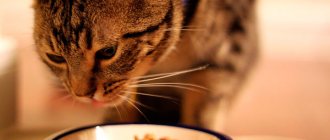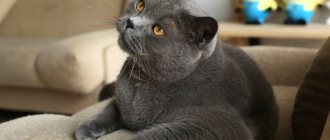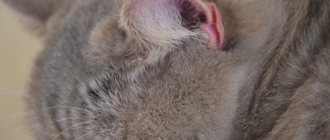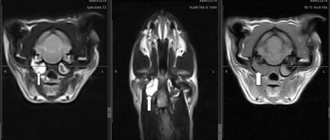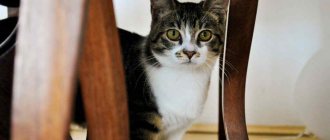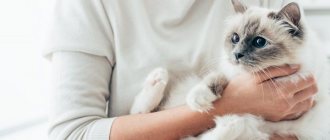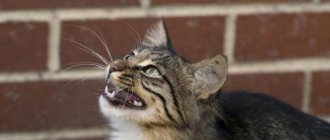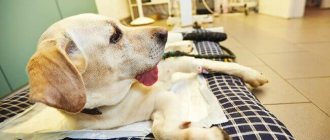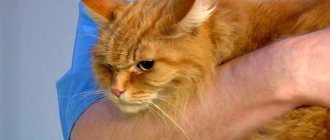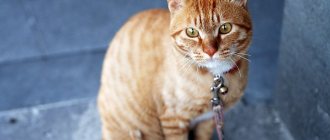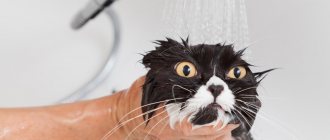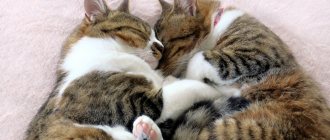When there is no reason to worry
In some cases, a cat does not eat anything for understandable, objective reasons, for example,
a change of season - if a cat is allowed outside, in the spring it may eat less, as the body adjusts to the summer season: besides, the animal often finds other food on the street; poor appetite is observed during the breeding season, which also occurs in spring: the cat may become more aggressive, overexcited and lose significant weight; strong changes in weather, pressure changes can also cause a loss of appetite: especially if the cat is already quite old; finally, if the owner washed the bowl with a chemical and inadvertently did not completely wash off the residue, this also explains why the cat lacks appetite.
Thus, you should only worry in cases where other symptoms are added to the loss of appetite - for example, nausea, vomiting, lethargy for a long period of time. It is possible that the cat has developed a stomach or intestinal disorder, so an urgent consultation with a veterinarian will be needed.
Lack of appetite in a cat is always associated with the presence of some disease. Ignoring this phenomenon can lead to progression of the disease for your pet.
How to properly increase your cat's appetite
It seems that no one will dispute the opinion that a four-legged friend over time becomes a full member of the family. Your favorite animal is looked after like a small child. And if the cat has no appetite, then everyone worries and asks the question - what to do? This happens from time to time. There may be several reasons for a lack of appetite in cats. And this means that you should fight them differently each time.
We recommend reading: Dog Urinates Frequently, Treated with Antibiotics
It happens that a cat loses its appetite, but it remains active and even playful. Nothing has changed in her behavior. This means only one thing: the cat is healthy and there is no need to worry. You can change your favorite animal’s normal diet, or you can ignore it. Cats, as a rule, unlike dogs, know how much food they need: they rarely overeat and very rarely refuse food without reason. Therefore, giving goodies in order to attract attention to the food may result in the animal becoming capricious and not recognizing healthy cereals in the future.
And if your cat has no appetite for more than a day, you should definitely take the animal to an appointment with a veterinarian. Test results and a thorough examination will reveal the reason for refusing food. Do not forget that animals, like people, experience toothache. Often the cause of such forced fasting is diseases of the gastrointestinal tract, which cats also suffer from. All this is quite serious and you should not self-medicate.
Animals should be offered a varied diet. There are vitamins that are created specifically for cats. Such vitamins with special additives in the form of catnip and seaweed, yeast and other useful elements are sold in all pet stores. When asked how to improve a cat’s appetite, sellers will select the necessary vitamins and offer them to you. The fact is that vitamins are given depending on age
Source
Drug treatment of anorexia
The veterinarian always has a “last resort” option - feeding the animal using a tube. Extreme because additional stress and hospitalization do not contribute to recovery. If the pet’s condition allows it to wait, drugs that “awaken” or increase appetite are used as treatment:
Apilak is a drug made from royal jelly of bees. Considered safe, indicated for people, including infants and nursing mothers. Contraindicated in cases of adrenal gland dysfunction and allergies to bee products.
Pernexin - contains B vitamins and substances that activate the liver. Considered safe and natural, prevents anemia.
Peritol is a drug containing substances that stimulate the production of serotonin and histamine, hormones responsible for the feeling of hunger.
Anabolic steroids and Insulin are guaranteed to increase appetite, but should not be used without prior examination.
Valium - in the form of tablets or injections, instantly awakens the appetite. Long-term treatment is not recommended.
Features of feeding kittens and cats
Unfortunately, both small kittens and nursing cats can become poisoned.
What should a kitten be fed if it is poisoned?
General principles are followed, but with minor adjustments for age:
- Kittens under 10 months of age are prescribed a 12-hour fast.
- Give water little by little, so as not to cause vomiting, 10-15 drops, up to 1 ml at a time.
- The frequency of feeding a kitten depends on its age. Healthy babies switch to regular meals twice a day at the age of 4 - 6 months. In case of poisoning, it is recommended to give the kitten food every 4 hours.
Diet for a nursing cat
During lactation, a cat requires 2–3 times more energy. If a nursing cat is poisoned, you can feed the following foods:
- milk, preferably goat's;
- cottage cheese;
- rice and oatmeal porridge;
- boiled lean meat;
- red fish.
It is recommended to wean kittens if they are already well fed. Due to illness, a cat may lose milk - you need to be prepared to feed the kittens artificially.
Feed a nursing cat frequently, every two hours. After a few days, the number of feedings can be reduced and correlated with the suckling of the kittens.
Watching the animal
In itself, reducing the amount of food consumed is not critical. But if, along with a lack of appetite, you notice other changes, for example, in behavior, then most likely the reason lies in your pet’s illness. There can be a lot of reasons for this. Sometimes this condition is caused by a mild cold or the presence of parasites. In this case, it is very easy to correct the situation at home, without even resorting to the help of a veterinarian.
It’s another matter if the cat begins to eat less due to developing respiratory diseases, digestive tract problems and diarrhea. These are all quite serious problems that require the intervention of a veterinarian. Do not forget that the clinical picture may be blurry, so it is best to be examined by a doctor and take the necessary tests. Perhaps the cause is gastrointestinal disease or dental disease. Suffering from pain, the animal refuses to eat, so treatment should begin only after diagnosis.
medicine for cat appetite
Best Appetite Pills
The problem of lack of appetite is not as simple as it might seem at first glance. A good appetite has always been considered the key to a healthy, strong body, but its absence almost always leads to a deficiency of vitamins and microelements, and, as a result, to various diseases. And physical exercise or walks in the fresh air do not always help in solving this problem.
Lack of appetite for more than two weeks is a serious cause for concern. It is not surprising that in many cases doctors recommend solving this issue with the help of medications. In this article we will talk about which appetite pills are considered the most effective.
This drug is a serotonin antagonist. These mediators suppress the feeling of hunger, and Peritol effectively blocks their action, thereby increasing appetite. You need to take ½–1 tablet 3 times a day.
Insulin tablets are famous for their high effectiveness in increasing appetite, which must be taken 5-10 units before meals. According to reviews, this drug has its beneficial effect after 20 minutes. It is only important to consult a doctor before taking the medicine.
Almost all anabolic steroids quickly and effectively induce appetite. At the same time, the drug Primobolan has the best reviews for solving this problem. It is only important not to forget about the side effects inherent in all anabolic steroids.
GHRP-6 and GHRP-2 capsules are medications whose action is aimed at stimulating growth hormone and increasing muscle mass. They act by influencing glucose metabolism, which is why they increase appetite well.
Cat owners know that proper and wholesome nutrition is the key to their health, beautiful appearance, activity and good mood.
Source
Treatment methods
When a cat suddenly begins to eat a lot, it may be expecting a replenishment. Her body requires more food for the babies growing inside. Before treatment, you should make sure that the individual is not carrying kittens. In case of severe illnesses, the doctor prescribes a course of necessary medications, IVs, and injections. If there are infestations, then it is necessary to eliminate the unwanted inhabitants with the help of medications. In the absence of the opportunity to purchase special cat medications, you can use the human drug - Pirantel. As cats get older, their appetite may either increase or decrease. To maintain the health of your pet, it is recommended to undergo regular examination of the animal at the veterinary clinic. If necessary, urgently take measures to treat your beloved four-legged friend.
A pet’s reluctance to eat can be associated with pathological and physiological factors. Appetite stimulants for cats are selected by a veterinarian depending on the reasons that provoked the problem. A kitten's lack of desire to eat food may be due to an inappropriate bowl or the pet does not like the food itself. Also, the cause of poor appetite often lies in the influence of stress. Such factors can be easily eliminated and the pet will start eating again. But if the disorder is due to illness, then the cat will additionally experience vomiting, lethargy, fever, and other unpleasant symptoms that cannot be eliminated without the help of a specialist.
Nervous system disorders
This is another common reason why a cat has no appetite. Cats and cats are quite sensitive animals. They react to almost any significant change in lifestyle, and sometimes the pet’s reaction can be unpredictable. Obviously, some situations are likely to cause stress, which explains why my appetite has disappeared
:
Moving to a new place
For example, a kitten that has been separated from a cat and settled in a new home is at risk. Long, hours-long journey. The arrival of a new pet. Birth of a child. Dangerous situations (for example, a fight with a cat, the threat of a dog attack, etc.). Insufficient attention from the owner, conflict atmosphere. Long-term absence of the owner (it is known that cats very often become attached to a specific person and do not like change). In rare cases, cats lose their appetite even due to harmless reasons - changing the bowl, changing the location of the toilet or rest area
Therefore, it is worth analyzing whether there were any significant changes the day before. If the reason for loss of appetite is related to stress, you need to give your pet as much attention as possible.
In rare cases, cats lose their appetite even due to harmless reasons - changing the bowl, changing the location of the toilet or rest area. Therefore, it is worth analyzing whether there were any significant changes the day before. If the reason for loss of appetite is related to stress, it is necessary to give your pet as much attention as possible.
Review of high-calorie cat foods
Medicinal high-calorie food is a good alternative to natural food. They are balanced and designed specifically so that the animal can gain weight, and the owner does not need to waste a lot of time on cooking. Several manufacturers have lines for malnourished cats. Such feeds have a high calorie content, increased palatability, and increased protein content. They contain vitamins and minerals necessary for recovery.
If the animal is severely emaciated, at first it is better to give it canned food in the form of pate - food of this consistency is better absorbed. After diluting with water, they can be used for feeding using a syringe or tube. They can be fed to both an adult cat and a kitten. Since such foods contain a lot of proteins and fats, they are contraindicated for diseases of the liver and pancreas.
Canned food for weight gain:
- Royal Canin Recovery. Well suited for animals with reduced appetite - it has good taste and is high in calories, so even a small amount of food will provide your pet with nutrients. It contains a complex of antioxidants that protect cells from oxidation, helping to strengthen the immune system.
- "Eukanuba High Calorie". It has a high level of nutrients and an optimal ratio of omega-3 and omega-6 fatty acids. Contains sugar beet pulp, which has a beneficial effect on intestinal function. Can be used as a therapeutic food for diabetes, heart and vascular diseases.
- Hill's a/d. Contains easily digestible components, a lot of protein, and has a rich vitamin and mineral composition. The food is highly palatable.
You can fatten underweight animals using the following dry food:
- "Royal Canin Convalescence Support Cat." Designed for recovery after illnesses and operations, suitable for exhausted animals. Allows you to quickly gain muscle mass due to a large amount of protein, has a pleasant taste, contains antioxidants and chondroitin, which improves the condition of joints and cartilage.
- "Eukanuba Renal." The food is suitable for cats whose thinness is associated with kidney and liver diseases. Contraindicated during pregnancy and lactation.
- "RENAL SPECIAL RSF 26". Designed for pets with chronic renal failure, accompanied by loss of appetite and poor digestibility of food.
- "Royal Canin Senior Consult Stage 2 High Calorie." High calorie food for cats and kittens over 7 years old. With age, the ability to absorb fats decreases, so food should be more nutritious. The product contains antioxidants and chondroprotectors, helps maintain normal functioning of the kidneys and urinary system.
Why does a cat lose the desire to eat?
A decrease in appetite in a kitten or an adult animal is not always associated with internal problems. Physiological factors that do not require therapeutic measures can lead to a partial loss of interest in food. In some cases, this problem can be easily solved, you just need to analyze the pet’s behavior, in others the situation needs to be left to chance, since it is caused by natural processes in the cat’s body.
Reaction to external conditions or stress
Kittens and adult cats have a flexible psyche. Anything can throw them out of balance: a trip in a car, a visit to a veterinarian, the arrival of a new pet or child in the home, moving to another room, quarrels and screams in the family, etc. In most animals, stress leads to a decrease in appetite.
Just like people, cats don't eat well in hot weather. The owner of such a pet is required to ensure that the four-legged pet drinks enough water in hot weather.
Changes in feeding conditions (place, type of food and its consistency, etc.)
Stability is important for felines. They do not like it when bowls with food and water are moved from place to place, or when the usual type of food is changed. Some animals react so strongly to any kind of change that they may lose their appetite. If your pet begins to eat poorly, the reason may be:
New feeder location
It is important that the bowl does not stand in the aisle where the inhabitants of the home are constantly scurrying around, preventing the cat from eating peacefully. When rearranging it, you also need to make sure that it is convenient for the cat to get food out of it.
New food
This can happen if a new dish was introduced into the four-legged pet’s diet, which for some reason did not interest him, or the finished food was replaced with another one that differs from the previous one in taste, smell, appearance or consistency.
- The smell coming from a bowl of food. Cats are clean creatures, so if you rarely clean the food container, you shouldn’t be surprised that your pet is reluctant to approach it.
- Rancid, spoiled or soggy food. You need to pour exactly as much dry granules into a bowl as the cat can eat at once. Otherwise, contact with oxygen will negatively affect their taste and smell, and accidental ingress of liquid from a nearby water container will affect their consistency.
Decreased need for food due to age or physiological condition
If your cat has lost her appetite, sleeps longer than usual, has become calmer and more affectionate, vomits in the morning, and goes to the toilet frequently, she is most likely pregnant. Another reason why a four-legged pet may lose its former interest in food is the natural aging process in the body. For older animals this is normal and there is no reason to worry.
As cats begin to age, their sense of taste and smell of food becomes dull. In addition, four-legged “retired” animals, due to natural changes in the body, have a deteriorating ability to absorb it. With age, representatives of this family stop moving actively, so they require much less energy, which is precisely what food provides. If a tailed pet that has passed the 11-12 year mark eats little, but generally does not look emaciated, there is no reason to worry.
What do cats like?
When you adopt a pet, you should be well aware that you are accepting a great responsibility. You must create an environment at home so that the animal feels comfortable, cozy and calm. Cats especially need this comfort. If a furry beauty feels in danger, if she is offended, then she may refuse food due to constant stress. This is a natural phenomenon. Therefore, look around again to see if your cat is really having a good life.
It should be noted that cats love to eat. And if the puppy needs to be given food on a schedule, then the cat likes it if there is always food in the bowl. Therefore, try to leave some dry food even at night. In addition, cats love to sleep, so provide them with a warm place. A well-rested pet will eat with great appetite. Finally, furry beauties love to play. Provide him with toys, boxes in which he can hide, mice and other paraphernalia.
We recommend reading: Seizures in a Dog with Toxoplasmosis
Internal diseases of cats
The cause of poor appetite or refusal to eat can be both viral and non-infectious internal diseases. By carefully observing your pet, you can notice their signs.
- Musculoskeletal system. Diseases of bones, muscles, cartilage and tendons often occur when cats are fed improperly. Lack of minerals and vitamins leads to the destruction of bone tissue. Cats' appetite changes - they begin to chew wooden objects and other things. Digestion is disrupted, constipation and diarrhea may occur. If treatment is not carried out in time, bone and cartilage tissue will begin to deteriorate.
- Skin diseases. Insufficient coat care and improper nutrition can lead to skin diseases. Various mechanical irritations lead to the occurrence of dermatitis or eczema. This causes suffering to the cat, as a result of which the appetite sharply decreases and the animal loses weight. Upon examination, it is easy to notice the first signs of the disease - pustules, papules, scratching, hair loss at the site of the rash.
- Nervous system. Nervous diseases include: epilepsy, various convulsions and paralysis, paresis and fainting. Before and after the attack, appetite is reduced. Any convulsive muscle twitching or inappropriate behavior of the pet is a reason to urgently consult a veterinarian.
- Digestive organs. Gastrointestinal disorders can lead to the death of a cat. The first sign of the disease is refusal to eat. It is accompanied by bloating, diarrhea, vomiting, bad breath, and increased salivation. The causes can be both internal diseases of organs and infectious diseases. You cannot do without consulting a doctor.
- Urinary system. Cats are more likely than other animals to suffer from kidney disease. At the same time, they become lethargic, apathetic, and eat poorly. The amount of urine may be increased. During treatment it is necessary to follow a diet.
- The cardiovascular system. Congenital or acquired pathologies are quite common in domestic cats. Shortness of breath, bluish coloration of mucous membranes, cough, lethargy, poor appetite are signs of the disease. Most often, a chronic cough indicates heart problems.
Almost any disease leads to a decrease in appetite. For a cat owner, the main thing is to notice and treat the disease in time.
It is important to remember that proper nutrition is the basis for a good appetite and the prevention of many diseases, and a veterinarian is your best friend
When should you increase your cat's appetite?
A good appetite is desirable for all felines, but nutritious nutrition is especially important for kittens, pregnant and lactating cats. If the kitten is thin, eats little and without pleasure, but is healthy, you need to improve its appetite in the following ways:
If the kitten is thin, eats little and without pleasure, but is healthy, you need to improve its appetite in the following ways:
- changing the basic diet;
- special vitamins to increase appetite;
- feeding special cat grass sold in pet stores.
Fish oil has also proven itself well. It is given daily to adults 5 drops, to kittens - 3 drops. Combining fish oil with vitamins increases effectiveness.
You can stimulate the appetite of a healthy, active individual by introducing into the diet some low-fat fermented milk drinks that stimulate digestion. You can use special additives (seaweed, yeast, catnip). Raw yolk, offered in the morning on an empty stomach, increases the efficiency of the stomach. When feeding your pet dry food, it is advisable to replace it with dry food for cats with sensitive digestion.
What measures can be taken?
Poor appetite, even in a healthy cat, is a cause for concern. When you refuse to eat, the animal’s body stops receiving the necessary vitamins and minerals. This may affect the activities of individual organs and systems.
Some cats can go without food for 1 to 5 days. They arrange a fasting day for themselves. If during this period the pet remains cheerful and active, and this happens once every few months, there is no need to worry. But kittens, pregnant and lactating females need to be provided with adequate nutrition.
If you don't know what to do if your cat has poor appetite, pay attention to the following tips:
- Try changing your diet. Animals may become bored with the food if you use it for a long period.
- Use cat grass. You can buy it in the store or germinate it yourself at home. The herb stimulates the intestines and thereby increases appetite.
- Give your animal vitamins. Pharmacies and pet stores sell special vitamin complexes, but you should consult your veterinarian before purchasing them. Fish oil may be a good alternative. It can be given to both adult pets and kittens.
Advice! During the molting period, be sure to give your cat a special paste that helps remove the fur out. This will prevent its accumulation in the intestines.
Additional symptoms
If your pet refuses to eat and has lost a lot of weight, this may indicate a serious illness. In this case, stimulating appetite will be useless if the owners do not cure the underlying disease. If there is pathology in a pet, the following alarming signs are observed:
Against the backdrop of the developing disease, the pet looks lethargic.
- lethargy and apathy;
- bloating;
- changes in the structure and color of the coat;
- impaired stool, in which diarrhea may be replaced by constipation;
- unpleasant odor from the mouth;
- itching sensations in the anus;
- impurities in urine and feces, blood and/or mucus;
- thin skin and possible bluish discoloration;
- gagging;
- rapid heartbeat;
- pain in the abdominal area;
- rapid breathing.
Pathological causes
Why does a kitten's whiskers break: the main reasons and what to do
Don't delay visiting the veterinarian. A cat may not eat enough due to serious illnesses. In this case, lack of treatment will lead to the death of the animal.
Parasites
If the cat has lost a lot of weight, but eats well, then this is the first sign of infection with worms. The invasion is accompanied by nausea, perverted appetite, and bloody clots in the stool.
Parasites can cause loss of appetite in animals
Parasites are not always visible in feces, and therefore the owner may not be aware of the pet’s illness. Therefore, a person can see that a cat is losing weight, but eats well, but this may not be clear to him. In this case, you need to submit your stool for analysis, which will reveal the eggs of the worm.
Parasites can affect not only the intestines, but also all internal organs. In severe cases they are fatal. To get rid of worms, special tablets are used, which are given to the animal according to the scheme.
Oncology
Pets are also susceptible to malignant tumors. They appear especially often in cats that were sterilized late.
Important! Benign tumors also occur, but are rarely detected. Any large neoplasm negatively affects the animal’s body and causes unpleasant symptoms - loss of appetite, lethargy, drowsiness and others
Any large neoplasm negatively affects the animal’s body and causes unpleasant symptoms - loss of appetite, lethargy, drowsiness and others.
Treatment and maintenance therapy in this case can only be prescribed by a veterinarian. Therefore, if a cat is not eating well and is losing weight, it is worth taking it to the clinic for examination. Only this will give a complete picture of the problem.
Diseases of internal organs
Poor nutrition and congenital problems can lead to various diseases. A diabetic cat is constantly thirsty and may refuse to eat.
If there are problems with the liver and inflammation in the genitourinary system, the animal has an appetite, but the cat will not want to eat. It will only cause discomfort.
Appetite may suddenly disappear during infectious diseases. With rabies, hydrophobia appears, i.e. the animal is thirsty, but does not start drinking. Gradually, excessive salivation, hypersalivation and other problems increase.
Important! Rabies cannot be treated and the animal must be euthanized. With distemper, a cat develops a high fever, frequent diarrhea and vomiting.
In this case, the pet can only be helped if the disease is detected early.
Against the background of weak immunity, minor inflammatory processes may appear. For example, stomatitis is damage to the gums in the form of small ulcers. All this happens against the background of an exacerbation of the leukemia virus. With such a disease, the animal needs constant maintenance medications. Only they can extend the life of a cat. Viral enteritis is characterized by its rapid nature.
A sudden loss of appetite is accompanied by bloody diarrhea and vomiting, dehydration and death quickly occur. Therefore, you should not delay your visit to the veterinary clinic.
Only testing and examination will allow you to prescribe competent treatment that will save the animal’s life.
Metronidazole for cats: instructions for use
First of all, all pet owners should remember that when choosing self-medication or visiting a veterinarian, if the animal is sick, you need to choose the latter.
Only an experienced specialist can give accurate advice on questions asked, make a diagnosis and prescribe the correct treatment. Sometimes the disease is serious, and self-treatment can only make the situation worse.
Effect of the drug
Initially, the medicine was released for the treatment of people, but time of trials and experiments showed that the drug perfectly helps many animals: cats, dogs, horses. Parasites are much more common in animals than in humans. The opinion of most veterinarians is that any infection can be treated with Metronidazole. After 7-8 hours, 80% of the drug remains in the animal’s body.
Dosing of the drug
Only an experienced veterinarian can answer the question of how much this medicine should be given to an animal. Under no circumstances should you make such decisions on your own, calculate proportions, measure grams.
However, for different animals the norms differ markedly. For example, cats need to be given 8-10 mg per 1 kg of weight, dogs - 15-20 mg per 1 kg of weight, 2 times a day.
Is the drug harmful to cats?
However, it happens that the animal had other, undiagnosed diseases, and the use of Metronidazole aggravated its general condition. Like all antibiotics, metronidazole negatively affects the immune system; after treatment they need to:
Veterinarian advice
It just so happens that animals, in particular cats, are especially susceptible to various kinds of parasites. Therefore, it is necessary to regularly carry out prevention against worms.
If at a certain stage you are being treated with Metronidazole and there is a suspicion of enterobiasis, you need to simultaneously treat the cat for parasites, men
Source
Why is there a problem?
Physiological reasons
Often a cat’s poor appetite is associated with dirty dishes or the selection of a low-quality bowl for eating food. There are other natural factors that lead to a cat’s reluctance to consume food:
Increased air temperature. Loss of appetite often occurs in the summer during hot weather
In this case, it is important to provide your pet with constant access to clean, drinking water. Sudden changes in the cat's diet. Change of feeding place. If the owners constantly rearrange the cat's bowl, then she may lose her appetite completely or partially.
To fix the problem, simply return the cat's plate to its place. Impact of stress. Aging of the body. With age-related changes, the pet becomes lethargic, moves less and there is a decrease in appetite. Hair accumulation. Cats are clean animals and love to lick themselves constantly, which is why a lot of hair collects in the stomach. In this case, the cat’s lack of appetite can also cause vomiting and problems with stool.
Pathological factors
If the cat has lost its appetite and has lost a lot of weight, this may indicate the development of the disease. The following pathologies are identified that influence the reluctance to eat food:
- infection with small parasites;
- diabetes;
- heart diseases;
- kidney failure;
- intestinal obstruction;
- inflamed upper respiratory tract and paranasal sinuses;
- anemia;
- diseases associated with tooth decay;
- inflammation of the pancreas;
- leukemia;
- inflammatory reaction in the intestines;
- pills and other drugs that negatively affect the cat’s appetite.
Increased appetite in cats
Polyphagia is a term for an eating disorder characterized by increased appetite and gluttony.
You should know that polyphagia in cats can be caused by both psychological reasons and a number of diseases. In the first case, as a result, we often see behavioral changes and overeating, which causes persistent weight gain and obesity. Polyphagia associated with the disease can appear in two ways: either weight gain or weight loss.
Psychological or behavioral. Polyphagia may be related to aging, as some animals tend to become more voracious with age.
A weak ability of the gastrointestinal tract to absorb nutrients may cause increased appetite while losing weight. Examples of this include inflammatory bowel disease, disorders, some types of bowel cancer, and exocrine insufficiency (insufficient production of digestive enzymes) of the pancreas.
Diabetes mellitus can lead to increased appetite in cats because the body does not fully utilize the sugar (glucose) that enters the bloodstream.
Insulin-secreting tumors (insulinomas, liver tumors). Insulin leads to a decrease in blood sugar levels and, as a result, an increase in appetite.
A prolonged increase in a cat's appetite can have a huge impact on her body. You should pay attention to such signs as:
Changes in physique. You may notice exactly how fat deposits are distributed: throughout the body or just in the abdominal area, for example. Or, on the contrary, muscle atrophy is noticeable.
Vomit. Some animals eat too quickly, resulting in an overcrowded stomach.
Source
Proper nutrition
It's no secret that the key to a good appetite is a healthy stomach. So forget about feeding cats milk. This is a predator that needs fresh meat, poultry or mice. To keep your pet’s digestive system normal, feed her one raw yolk a couple of times a week. A professional food for sensitive digestion wouldn’t hurt either. But even this cannot be given to an animal on an ongoing basis. And even more so, soups, leftovers from our table, fatty broths, salty and sweet foods are not suitable for cats. Take care of your pet's body. She needs meat and fish, grains and greens in small quantities. The latter would be catnip. What is it for? This is a kind of stimulant and drug, but in small quantities the herb can improve digestive processes. Therefore, you only need to give it a few leaves.
Vitamins for cats' appetite - catnip, yeast or seaweed?
Vitamins to increase appetite in cats have special additives in the form of seaweed or catnip, as well as yeast and other useful elements.
Many owners look after cats like they would a small child. If your pet has no appetite, then the question arises - what to do? There are several reasons for a cat's lack of appetite. This suggests that this problem should be dealt with differently each time.
If your cat has lost his appetite, but remains playful and active, then there is no need to worry. In this case, it is recommended to change your normal diet. Cats, unlike dogs, know how much food they need. If you start giving your pet different goodies in order to attract attention to the food, then he may begin to be capricious and stop recognizing healthy cereals.
If the cat has no appetite for more than a day, then the animal should be taken to the veterinarian. A thorough examination and test results will show the reason for refusing food. Often the cause may be toothache or diseases of the gastrointestinal tract.
The cat should receive a varied diet. There are special vitamins for cats' appetite. Often, cat vitamins that are designed to increase appetite have special additives in the form of seaweed or catnip, as well as yeast and other beneficial elements. Cat appetite vitamins should be used according to the age of the animal. The use of specially sprouted grass, the seeds of which you can buy and grow yourself at home, is considered useful. This herb can serve as a source of vitamins for cats’ appetite. In addition, the grass and vitamins increase the animal’s immunity.
Be sure to deworm your kitten. Now in the vet
The key to a good appetite for any cat is a healthy stomach. For this reason, a pet’s daily menu should be approached
Source
Eating problems
Sometimes owners do not pay much attention to what they feed their pet. If the diet is too monotonous, the question may later arise of what to do if the cat loses its appetite. Obviously, the animal may get tired of the same food over time, so the cat will be extremely reluctant to eat it. Then it is enough to introduce new components - feed or familiar homemade food.
shutterstock
Another problem is insufficiently high-quality products, for example, sausages, pates of questionable composition, cheap food from little-known manufacturers, etc.
It is important to pay attention to the composition and, if necessary, consult a veterinarian. It is possible that even some normal foods are contraindicated for your cat due to the characteristics of the digestive system.
First aid in case of diarrhea.
Treatment of diarrhea in a cat
very individually, watch your pet, be sure to submit the necessary tests to the laboratory.
Diarrhea in cats
can be caused by a variety of reasons.
Only a veterinarian can prescribe the necessary treatment depending on the condition of the animal and the results of its tests. Infectious diarrheal diseases in cats can be caused by pathogenic bacteria. When trying to find the causes of diarrhea in a cat,
pay attention to its general condition, lethargy, depression, how it eats, whether it has a good appetite, whether it strains during bowel movements, whether there is vomiting, as well as color, consistency, smell, the presence of blood, mucus in stool and frequency of bowel movements.
Changes in the body caused by diarrhea
, life-threatening.
Dehydration
and loss of microelements, vitamins and minerals
very Be sure to feed your cat 5% glucose
from a syringe without a needle to maintain it, glucose stimulates sodium absorption.
As an urgent first aid, you can use pomegranate peel , pomegranate peels are brewed with boiling water, infused and given from a syringe WITHOUT a needle, a soaked soft small piece of peel can also be given to the sick person, or you can use the walls of chicken stomachs
. They are sold in supermarkets along with the chicken gizzards themselves.
Chicken stomachs are used as a medicine for dysbiosis, improves appetite, for digestion, as a remedy for diarrhea:
In order to
improve digestion,
it is better to take
the walls of chicken stomachs,
dried and ground into powder.
This is a yellow film that covers the inside of the stomach; it contains digestive enzymes
. The mucous membrane of the stomach has special cells that produce substances that promote normal digestion. The yellow films are removed, this is from
Source
Proper nutrition
A speedy recovery for a pet after intoxication is impossible without following a proper diet. What to feed a cat after poisoning is a concern for every responsible owner. As a rule, after an illness the animal loses its appetite for a long time.
However, special attention should be paid to nutrition issues
Due to the fact that many toxic substances are highly soluble in fats, at first you should not give the animal food containing them. Only vegetable fats are allowed in small quantities. This issue is especially relevant when phosphorus-containing substances (usually pesticides) and rat poison enter the body. For the same reason, you should not feed your animal milk. In addition, fatty foods will slow down the recovery of the liver, which suffers from any poisoning of the body.
Therapeutic food for a cat after poisoning should be gentle on the digestive system. Experienced breeders recommend feeding your pet during the recovery period 3 - 4 times a day for 1.5 - 2 months after poisoning.
If intoxication has occurred due to eating poor quality food, then after a daily fasting diet the animal should be given rice water. It is prepared in water.
After 2 - 3 days, the pet can be offered viscous porridge based on rolled oats and pureed buckwheat. You should not feed a sick cat pearl barley, semolina, or corn porridge.
Gradually, you can add boiled vegetables (carrots, broccoli, pumpkin) to your diet. After 5-7 days, if the pet’s condition is satisfactory, lean poultry and rabbit meat can be introduced into the diet. The meat should be given boiled, in small pieces or crushed in a blender until pureed. Fatty fish, table food, and canned food are strictly contraindicated.
You can give your animal low-fat cottage cheese. You should abstain from milk, cheese, and sour cream for the first 2 to 3 days. It is useful to give low-fat kefir if there is no digestive upset.
If before poisoning the animal was fed with ready-made formulas, during the recovery period it is recommended to give super-premium medicinal food, for example, Hills I/D for food poisoning, Hills L/D for liver problems due to toxic substances or K/D, if the kidneys were damaged by poisoning.
In the Royal Canin food line, you can use the Gastro Intestinal composition, which ensures maximum digestive safety, as well as Hepatic food, which supports liver regeneration. A veterinarian will help you choose one or another medicinal food, taking into account the type and form of poisoning.
Owners often note that after poisoning the cat does not eat. After severe intoxication, this phenomenon is often observed. If there is no appetite for 2-3 days, you should not force feed the animal, as this may provoke vomiting. If the general condition of the sick pet is weakened, it should be regularly taken to the veterinary clinic for the administration of intravenous nutrient solutions. For this purpose, infusions of 40% glucose solution and saline are used.
Appetite problems in cats
A good appetite is a sign of a satisfactory state of the body not only in people, but also in cats. And even despite the fact that animals very often become fat, owners accuse their pets of being picky. In some cases, this is not pickiness at all, but loss of appetite, which is accompanied by a number of diseases, ranging from bad teeth to such a deadly disease as cancer.
Healthy animals eat with great appetite, and begin to act up only when their usual diet is disrupted. Cats should be fed more than once a day due to their small stomachs and rapid digestion of food. They should receive nutritious and tasty food in small doses. Cats, like people, have individuals with different metabolisms. Therefore, some need more food, others less.
If we take the average norm, then 30 g of food is enough for 1 kg of weight. In this case, the cat will feel good. But this is only an approximate norm. Let’s say that a Burmese will always eat more food than, for example, a Persian. For a domestic cat, on average, 250 Kcal is enough for a female and 300 Kcal for a male. Another important factor in calorie intake is the age of the animal, as well as the physiological state and degree of activity.
There is a misconception that if a cat catches mice, then it should be fed less. On the contrary, with good and regular nutrition, the cat will hunt even better. There are cases of refusal to eat if the owner does not pay enough attention to the pet or is absent from home for a long time. But as soon as contact is resumed, the cat will begin to eat normally and the weight will become appropriate.
By nature, cats are predators. They are characterized by infrequent consumption of large amounts of food. It is advisable to accustom your cat to feeding twice a day, placing the bowl strictly at
Diarrhea in a cat is a fairly common and unpleasant situation, both for the animal itself and for its owners. It is often caused by poor-quality food and gluttony of the pet itself, but the possibility of pathogenic and conditionally pathogenic microflora and/or parasites entering the animal’s body cannot be ruled out. What tablets for diarrhea in cats are used in veterinary medicine, and which drugs are the safest for the health and life of your cat?
Constipation
A condition in which stool is not expelled from the intestines for a long time. With prolonged constipation, intoxication is possible, that is, the body poisons itself with toxins, without being able to remove unnecessary substances.
You need to pay attention to how often your pet has bowel movements (walks in a big way). Kittens do this on average 2 times a day, adult cats - 1 time, in older cats the process can drag on for two days
There is cause for concern if the cat does not walk “largely” for more than two days or the periods between bowel movements are constantly prolonged and do not correspond to the norm. Causes may include poor nutrition, the presence of too much hair in the intestines or a foreign body.
Symptoms:
- bowel movements too rare or completely absent for several days;
- dry and hard feces;
- with prolonged constipation - refusal of food, lethargy.
